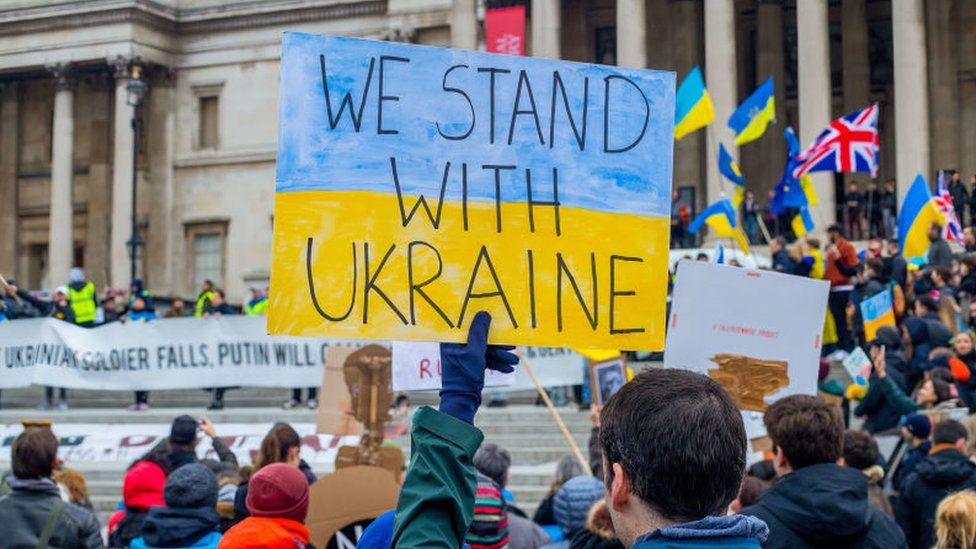Ukraine family visa scheme closes to new applicants
- Published

A visa scheme allowing Ukrainians to join family members in the UK has closed to new applications, the government has announced.
Home Office Minister Tom Pursglove said the decision was taken to ensure schemes for Ukrainians fleeing the Russian invasion were "sustainable".
The SNP said closing the family scheme "without warning" was "cruel".
The separate Homes for Ukraine scheme, external remains open for those who are eligible.
This allows people in the UK to host Ukrainian refugees even if they do not have family ties here.
More than 200,000 people have come to the UK under these schemes since the start of the conflict, which marks its second anniversary on Saturday.
On Sunday the government announced Ukrainians who had sought sanctuary in the UK under the schemes could apply for an 18-month visa extension.
New arrivals had been granted three years to remain, meaning the first visas were due to expire in March 2025.
However, on Monday Mr Pursglove revealed in a written ministerial statement, external the government was reducing the length of new visas issued under the Homes for Ukraine (HFU) scheme from 36 months to 18 months.
The statement also announced the closure of the Ukraine Family Scheme, which came into effect at 15:00 GMT on Monday.
Mr Pursglove said the family scheme was created as "an immediate response to the Russian invasion".
"Under HFU, there are accommodation checks, a minimum accommodation commitment from the sponsor and safeguarding checks, none of which feature in the Ukraine Family Scheme (UFS)," he said.
"This will strengthen and improve the sustainability of the schemes we provide."
The SNP's Home Affairs spokeswoman Alison Thewliss said: "The Home Office previously promised to stand 'shoulder to shoulder' with Ukraine - yet as we prepare to mark the two year anniversary of Putin's illegal war, it is now trying to slip these cruel measures under the radar."
Labour's shadow immigration minister Stephen Kinnock said: "Restricting family rights at a time when Ukrainian troops are under heavy fire in Donetsk sends the wrong message to the people of Ukraine about our willingness to stand with them.
"Ministers must urgently explain the justification for these measures and how they will ensure vulnerable Ukrainians are not put at risk by these changes."
Enver Solomon, chief executive of the Refugee Council, said: "The lack of options for Ukrainian and other families separated by war and persecution is already a huge problem. It's concerning that one of the few safe routes created for families to reunite will be closing at such short notice.
"This is a reminder of the disadvantages of bespoke, one-off visa schemes that support refugees in the short term but leave people in limbo, anxious and uncertain about their future. Instead of this ad hoc and inconsistent approach, the UK government should ensure the UK resettlement route is utilised as a global scheme and confers the same rights, including refugee family reunion, for all regardless of their nationality."
Mr Pursglove also announced changes to the eligibility requirements for sponsors on the Homes for Ukraine scheme, which he said would "ensure that visa holders have appropriate accommodation as well as the necessary in-country support to help them assimilate and thrive independently in the UK".
Sponsors for new visas will now need to be British or Irish citizens, or have the right to live permanently in the UK.
This is stricter than the requirements were for the family visa, which also allowed a family member in the UK with refugee status to be a sponsor.
Previously, a sponsor on the Homes for Ukraine scheme only needed to hold at least six months' permission to stay in the UK from the date of the visa application.
Sponsors must also pass security and criminal checks, while councils check the suitability of living arrangements.
Hosts are asked to offer a rent-free space for at least six months.
Related Topics
- Published18 February
- Published14 December 2022
- Published13 October 2022